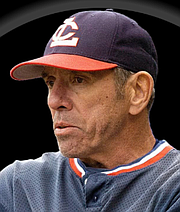THE FRONT ROW with MARK NELKE: Ed Cheff, as remembered by his former players
The boxing smokers.
The literal chopping of wood.
The tough love.
The life lessons learned.
Ed Cheff coached hundreds of players in more than three decades running the wildly successful baseball program at Lewis-Clark State College in Lewiston, and a few who hailed from North Idaho earlier this week shared memories of the legendary coach, who died last Saturday at age 78.
"He prepared me for life after LC State, whether it be my career as a coach, or everyday life. There’s things that I’ll teach to baseball players and kids until the day I die," said Zach Clanton, a pitcher from Lake City High, whose first two seasons at LCSC (2009 and '10) were Cheff's final two seasons as coach. "How he actually did it probably wouldn’t be accepted in today’s world, but I think it’s very much so needed. I think there were a lot of boys that went into his program that left as men."
"*I always thought the most impressive thing about him was his ability to separate the player from the person," said Travis Georgius, a catcher from Coeur d'Alene High who played four years for Cheff. Georgius' last season at LCSC (2010) was also Cheff's last year. "He really was a genuine, nice guy away from the field," Georgius said with a laugh. "He could chew your butt all day at practice, and right after practice was over, he’d ask you how your family was doing."
"He was basically the Bobby Knight of baseball," said Kelly Moffat, a middle infielder from Coeur d'Alene High, who played five seasons under Cheff (1990-94), then coached with him for one season at LCSC. "He was that kind of guy. He had a fiery, fiery attitude, and he pretty much demanded that you were the same way."
CHEFF WENT 1,705-430-2 record in 34 seasons at the LC State, guiding the Warriors to 16 NAIA World Series championships.
Moffat played second base as a true freshman on LC State's 1990 national title team.
"He once told me that I was the worst recruiting money the school had ever spent, when I was a true freshman," recalled Moffat, an assistant wrestling coach at Coeur d'Alene for the past two decades. "I was in the dugout at Bailey Field at Washington State, I had struck out with the bases loaded. If you struck out looking, you automatically got pulled out of the game. He did not tolerate that.
"I took a called third strike, the game was over, Wazzu was our big rival, and he told me I was the worst recruiting money the school had ever spent. And then about a week later, he told our shortstop — I was playing second at the time — that he was the worst recruiting money the school had ever spent. So it made me feel a little better; I wasn’t at the top of the list anymore."
Georgius remembers catching Cheff's eye when he played for Coeur d'Alene, and had a couple good at-bats during a game at Lewiston — against a pitcher Cheff was recruiting.
Later, as injuries hampered his playing career at LC State, and Georgius began to gravitate toward coaching, he said he got nervous before having to tell Cheff he was planning to coach Legion baseball one summer — rather than play summer ball.
However, he said Cheff appeared excited to see his player consider going into coaching, and he paid for Georgius to attend a coaching clinic in Spokane.
"Everyone thinks of him as the coach that’s yelling and doing crazy things, but as far as somebody who can speak … at conferences, and just talking baseball … but he’s an amazing speaker," said Georgius, who went on to become head coach at Lake City for three seasons before leaving to become a firefighter, a job he has held in Coeur d'Alene the past five years.
Clanton was recruited to LC State by a Warriors assistant coach, and as a pitcher, didn't work with Cheff as much as the hitters did.
"He had to ask our pitching coach what my name was. For the first two weeks of ball he just called me 'Coeur d’Alene Kid,'" said Clanton, who later coached the Coeur d'Alene American Legion baseball team, then coached at Wenatchee Valley College the past eight seasons, including a stint as head coach from 2015-21.
Cheff used to take his teams to Grand Forks, British Columbia each fall for a tournament. It was rare for a freshman to make the team for that trip — but Clanton and Trent Bridges, Clanton's classmate at Lake City, made the team.
"I came in to close out the first game of the tournament," Clanton recalled. "The guy that was in there was pitching well; there was no reason for him to come out. But the pitching coach made a change."
Said Cheff to the pitching coach: "Why did you make a pitching change? And you went with Clanton? You went with a freshman?"
"And he got someone warming up before I threw my first pitch," Clanton recalled.
Clanton ended up closing that game out. That spring, he pitched in two games in the NAIA World Series as a true freshman.
"And I remember him patting me on the butt, and I went from the 'Coeur d’Alene Kid' at the beginning of the year to feeling like, in some way, I won him over."
THE SMOKERS.
Just before the players left for Christmas break, Cheff would put on a boxing smoker, where players were matched up against similar-sized players, with headgear and padded gloves, for three 1-minute rounds.
Cheff, a Golden Gloves boxer growing up, would bring in someone with boxing experience, and they would spend a couple weeks teaching the basics of boxing to the baseball players — many of whom would be getting into a fight of any kind for the first time in this smoker.
"He always believed that baseball was a one-on-one sport," Clanton said. "That’s why he loved the idea of boxing … the pitcher against the hitter, one on one. When you got punched in the face for the first time, he learned a lot about his players, by how they responded.
"The guys that found the corner, and went up against the ropes and covered their face, there were a lot of guys like that. But there were also a lot of guys that, as soon as they got hit for the first time, every single punch that they threw after that was with the intent of knocking someone out. It just fired them up, and that’s what he wanted to see on the baseball field, too."
As "Eye of the Tiger" blared in the background, the smoker went on.
"I got hit in the face for the first time," Clanton recalled of his first smoker, "and I threw nothing but big right hooks for the rest of the match."
The idea of the smoker, his former players said, was to get over the fear of failure, controlling what you can control, and to experience "being comfortable being uncomfortable" ...
Georgius fought in the smoker twice in his four seasons at LCSC. He was injured the other two seasons, so he got to watch the fights with Cheff — watching his coach react to how his players reacted.
"My freshman year I went up against a junior," Georgius recalled. "We were about the same size, but he was a very thick Samoan. And he kicked the crap out of me. I basically threw some punches, and I think I threw my shoulder out on a couple of them, but you just forget, when you’re getting hit in the face, you can back up, you can move, you don’t have to sit there like Rocky and take it. And you realize how long a minute is."
What did Georgius learn from the smokers?
"I think a lot of that stuff was the realization that you can pretty much do anything once," he said. "It’s not going to be that bad."
Moffat was a standout wrestler in high school, so the one-on-one aspect of boxing wasn't much different.
"I fought four times," Moffat recalled. "Once I went up against Mike Hernandez, who was a Golden Gloves boxer. His dad was the one that came in and gave us a couple days of instruction. Him and I fought and for the first 30 seconds he was getting the best of me, so I went to a double-leg (takedown) and took him to the mat."
Later, when Moffat was coaching with Cheff, he asked him why he made his players fight in the smokers.
"And he goes, 'Because I want to build anxiety,'" Moffat said. "'Most of these guys have never been in a fight, have never been in a high-pressure situation. It’s not as big a deal for you because you were a wrestler; you felt that. … but then when that same situation comes in a high-pressure situation, when we’re playing for a national title, you realize the moment is not that big of a deal. You’ll get through it.'
"Before that, I thought it was so weird," Moffat said. "You could never do that stuff in this day and age."
"He said, 'I didn’t recruit you because you were the best baseball player; I recruited you because you know how to compete,'" Moffat said. "'I look for people who know how to compete. I can teach you to play baseball.'"
LOOKING BACK, Clanton said he wished he'd gotten to play four years under Ed Cheff, rather than just two.
"With all the harsh and intense stories, he was such a builder of men, and that’s what a lot of us will remember him as — someone who made us better for life after baseball," Clanton said.
"It was a really good experience for me," Georgius said. "I needed to learn how to respond to those types of expectations. It was definitely beneficial."
Moffat recalled that Cheff wouldn't allow his players to wear LC State baseball gear to class — he didn't want them to be identified as baseball players on campus.
"He once said 'Nobody cares what you know until they know that you care,'" Moffat said. "And he was really tough on me, really tough. But the one thing that he would do is he would make sure you knew he had your best interests at heart. It’s amazing what guys will do when they know a coach has their best interests at heart.
"Baseball was one thing, but he also wanted you to be a productive citizen."
Mark Nelke is sports editor of The Press. He can be reached at 208-664-8176, Ext. 2019, or via email at mnelke@cdapress.com. Follow him on Twitter @CdAPressSports.



